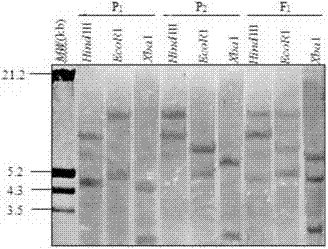A cotton transcription factor ethylene response factor gene
A technology of response factors and genes, applied in the field of biotechnology applications, can solve different problems and achieve fast results
- Summary
- Abstract
- Description
- Claims
- Application Information
AI Technical Summary
Problems solved by technology
Method used
Image
Examples
Embodiment 1
[0038] Embodiment 1 The acquisition of ethylene response factor gene (Gh ERF7):
[0039] The differential EST sequence obtained by mRNA differential display PCR technology was compared with NCBI in Blastn sequence, and it was found that this EST had a high degree of correlation with a part of the 3'-terminus of a published ethylene corresponding element binding factor (GhERF1) in cotton. similarity (93%). According to the characteristics of the ERF gene, using Vitex terrestriale 8891cDNA as a template, the forward degenerate primer Y3954 was designed in its very conserved functionally conserved domain, combined with the reverse primer Y2232R of differential EST RT-PCR for touch-down PCR amplification. The PCR reaction program is as follows: pre-denaturation at 94°C for 5 min; 30 cycles of touch-down program, denaturation at 94°C for 30 sec, annealing at 65°C for 30 sec, and the annealing temperature decreased by 1°C for each subsequent cycle until 56°C, extension at 72°C for 4...
Embodiment 2
[0042] Example 2 The copy number, structure and bioinformatics preliminary analysis of ethylene response factor family gene (Gh ERF7)
[0043] Southern blot technology ("Molecular Cloning" second edition, Science Press) analysis gene of the present invention has 2 copies in upland cotton ( figure 2 ), in order to analyze the genomic origin of the two genes GhERF7, we used two group A diploid original species African cotton (G.herbaceum, A1) and Asian cotton (G.arboretum, A2), two D group diploid The original species of Thurberi (G. thurberi, D 1 ) and Raymond cotton (G.raimondii, D 5 ), and the DNA of tetraploid upland cotton cultivars Jing 8891, Xiangzamian 2 and Zhongmian Institute 12 (AADD) were used as templates to amplify their genome sequences using GhERF7 gene-specific primers (Y3172F / Y2232R). The results show( Figure 4), the 808bp GhERF7 gene was amplified in Jing 8891, Xiangzamian 2 and two diploid African cotton (G.herbaceum) and Asian cotton (G.arboreum), but i...
Embodiment 3
[0049] Example 3 Analysis of Expression Characteristics of Ethylene Response Factor Gene Gh ERF7
[0050] The primers used are full-length primers (Y3172F / Y2232R):
[0051] Y3172F:5'-ATGGCGATGGGATAGGGAGATT-3'
[0052] Y2232R:5'-CTCCCGTGATTTCTATTTGGTA-3'
[0053] Semi-quantitative RT-PCR detection was carried out, and the results showed that the gene was constitutively expressed in various tissues (roots, stems, leaves) and at different stages of fiber development (0 days, 2, 4, 6 days after flowering) ( figure 1 ), but the expression level is different, except in the cotyledons of seedlings, there are also differences in different stages of fiber development. , 6 days), but no expression was detected after 10 days. This result reflects that the gene of the present invention is closely related to the initial elongation of fibers, and plays a vital role in controlling the development of cotton fibers.
PUM
 Login to View More
Login to View More Abstract
Description
Claims
Application Information
 Login to View More
Login to View More - R&D
- Intellectual Property
- Life Sciences
- Materials
- Tech Scout
- Unparalleled Data Quality
- Higher Quality Content
- 60% Fewer Hallucinations
Browse by: Latest US Patents, China's latest patents, Technical Efficacy Thesaurus, Application Domain, Technology Topic, Popular Technical Reports.
© 2025 PatSnap. All rights reserved.Legal|Privacy policy|Modern Slavery Act Transparency Statement|Sitemap|About US| Contact US: help@patsnap.com



